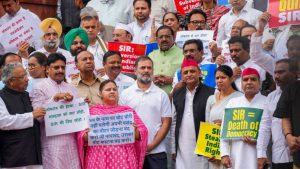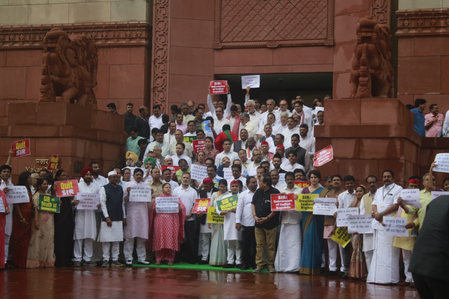Synopsis:
Disenfranchisement takes center stage as INDIA bloc challenges Bihar’s Special Voter Roll Revision, calling it a targeted move to suppress voters ahead of upcoming elections.
By Qalam Times News Network
Disenfranchisement at the Heart of Political Uproar

Disenfranchisement has become the flashpoint in a growing political confrontation as the INDIA coalition intensifies its resistance against the Election Commission of India’s (ECI) Special Intensive Revision (SIR) of the voter rolls in Bihar. What began as an administrative exercise has turned into a high-stakes face-off, with opposition parties alleging that the process is opaque, exclusionary, and deliberately designed to suppress voters in the lead-up to the crucial Assembly polls.
On July 29, as the Supreme Court heard petitions questioning the legality and timing of the ongoing SIR, leaders from across the INDIA bloc—Congress, RJD, TMC, DMK, SP, CPI, and others—united to voice strong dissent inside and outside Parliament. Their message was unambiguous: this isn’t just revision—it’s disenfranchisement by design.
UNITED FRONT ob Disenfranchisement: A Visible, Vocal Protest
A day earlier, Parliament’s Makar Dwar became the staging ground for a rare show of solidarity. Congress president Mallikarjun Kharge, Sonia Gandhi, Rahul Gandhi, Priyanka Gandhi Vadra, Akhilesh Yadav, Kanimozhi, D. Raja, and others stood shoulder to shoulder, denouncing what they called a “SIR-Attack On Democracy.”
Rahul Gandhi didn’t mince words: “SIR is a sinister conspiracy of vote theft. This directly attacks democracy and the Constitution.” Meanwhile, Trinamool MP Kalyan Banerjee hit out, “Earlier, voters chose the government. Now, the government wants to choose the voters.”
Voter List Revision or Voter Cleansing?
The ECI’s June 24 order triggered the storm. It asked voters in Bihar to furnish one of 11 approved documents for eligibility confirmation. Critics argue that the timing and method of this exercise threaten to erase legitimate voters—many from marginalized communities—from the electoral roll. The fallout? A potential exclusion of 66 lakh names, including 22 lakh deaths and 36 lakh “untraceables.”
The Opposition is crying foul. They’re not just questioning the data—they’re questioning the motive.
“No Election Worth the Name”: Boycott Threats Emerge
The political heat intensified after RJD’s Tejashwi Yadav hinted at boycotting the upcoming State elections: “If the results are predetermined by voter manipulation, why pretend it’s an election?” Congress leader Shakeel Ahmad Khan backed the sentiment, warning of serious consequences if voter rights are undermined.
Inside Parliament, the issue paralyzed proceedings. Slogans, placards, torn posters—all became tools of protest, as INDIA bloc MPs demanded a dedicated discussion on what they called an “institutional voter cleansing.”
Battlelines at the Election Commission and the Courts
On July 10, INDIA bloc leaders met Bihar’s Chief Electoral Officer, urging broader acceptance of Aadhaar, ration cards, and MGNREGA cards as valid documents. Multiple delegations have also knocked on the doors of the ECI in Delhi.
The Commission, however, remains firm. In an affidavit to the Supreme Court, it defended its authority to demand documentary proof. Though the Court nudged the ECI to accept Aadhaar and voter ID “in the interest of justice,” it stopped short of halting the draft list’s publication.
Numbers, Narratives, and Mistrust
CPIML’s Dipankar Bhattacharya raised a red flag: “How did 22 lakh people die in six months?” RJD’s Manoj Jha called it the largest disenfranchisement attempt in independent India’s history, noting the process’s disturbing opacity.
Opposition leaders worry that this pattern could repeat in states like West Bengal and Tamil Nadu, both headed for elections in 2026. The trust gap between the ECI and regional governments is clearly widening.
BJP Holds Its Ground, But Questions Mount
While the ruling BJP has dismissed the uproar as political theater, its leaders seem frustrated by Parliament’s disruption. BJP MP Banshilal Gurjar defended the ECI’s independence and blamed the Opposition for stalling legislative work over “an administrative exercise.”
Yet, the controversy shows no signs of fading. With mounting accusations of disenfranchisement, the fight over Bihar’s electoral roll has become a larger battle for democratic credibility—one that’s now playing out in courts, on the streets, and inside Parliament.








f7g03p
https://shorturl.fm/TxsYY
https://shorturl.fm/F1tJA
https://shorturl.fm/DeSQR
https://shorturl.fm/3RCDc